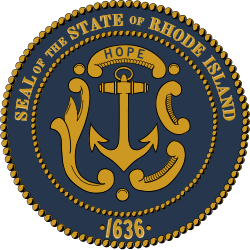| |||||||||||||||||||||
| |||||||||||||||||||||
 County results Allen: 50–60% Chapin: 50–60% 60–70% | |||||||||||||||||||||
| |||||||||||||||||||||
| Elections in Rhode Island |
|---|
 |
The 1851 Rhode Island gubernatorial election was held on April 2, 1851, in order to elect the governor of Rhode Island. Democratic nominee and former member of the Rhode Island House of Representatives Philip Allen defeated Whig nominee Josiah Chapin and Free Soil nominee Edward Harris. [1]


